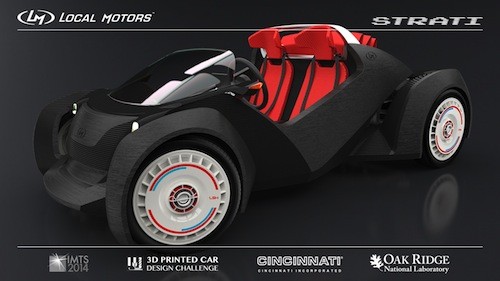3D printing and the future of transport
Over the past few years, 3D printing technology has taken substantial leaps both in how cost effective it is and the types of items it’s capable of creating.
Last month, US company Local Motors debuted its first-ever 3D printed car, Strati, at the International Manufacturing Technology Show in Chicago, Illinois. It wasn’t just a car on display, but one that could be driven. Comprised of 49 (or potentially 64) parts, the amount of parts used in this car are a substantial far cry from your average car, which is typically comprised of around 5,000 parts.

But having a car operate under very specific circumstances is very different from having one on the open road. However, if recent reports are anything to go by, Local Motors is expecting its 3D printed car to receive approval to drive on roads anytime soon. If this is the case, it will prove a substantial shift in the world of 3D printed vehicles at large, as well as revolution in the transport industry.
3D printed vehicles – cheaper, faster, more efficient
Across the board, one of the key perks of 3D printing technology is the most manufacture. While originally quite expensive, the costs of 3D printers have reduced significantly, as have the materials used to construct 3D objects from blue prints. Tools as simple as wrenches can be built en masse via 3D printing in relatively short periods of time. Naturally, the larger and more complex the item, the longer it takes to print.
Local Motors’ ABS/carbon fibre car, for example, takes 2 days to print in its entirety. But as improved iterations of 3D printers continue to be developed (with larger, more industrial versions becoming more and more readily available), printing times will no doubt reduce over the years.
The average, non-3D printed car takes approximately 17 to 18 hours to build, meaning that, for now, 3D printed cars do take longer to be completed. However, with less required parts and a process that is mostly automated, costs for creating 3D printed cars would be comparatively cheaper. Moving into the future, this means buying a car may become more cost effective for consumers. When doubled with multiple 3D printing stations, the output of these cars could become just as high as traditionally manufactured vehicles.
3D printed vehicles and the future of transport
The implications 3D printed vehicles could have on the future of transport at large are also quite substantial. One could be that regulations surrounding what qualifies as a vehicle could fundamentally changed. While 3D printed vehicles may use materials that can be used in other vehicles, the substantial reduction in parts and the shift in manufacturing standards may rewrite the book on what is deemed an vehicle.
Another change could be how such technology could affect the thousands of people employed in car manufacturing factories. We’ve already seen sobering reminders of what a drop in manufacturing can lead to, – particularly large numbers of employees being made redundant – so what happens when the manufacture of cars can be more or less automated? Once the materials are set, the 3D printer essentially does the rest of the work. While it may cut costs to the consumer, it could also cost those who’ve worked in the industry their jobs.
Questions can naturally be raised about whether or not the safety of these vehicles is on par with current safety standards. As has been shown with other 3D printed items, they’re not necessarily as tough as their traditional counterparts. In a more extreme example, a man 3D printed a gun to show it would only last a few shots before breaking apart. So 3D printed car manufacturers will have to prove that they can reach the same standards.
It’s hard to say just how exactly this technology will change the face of transport, but if Local Motors’ push to get its latest 3D printed car road certified is successful, it will usher in a new age for transport.